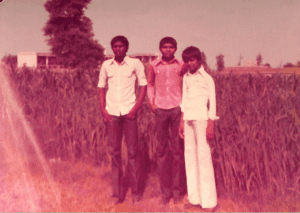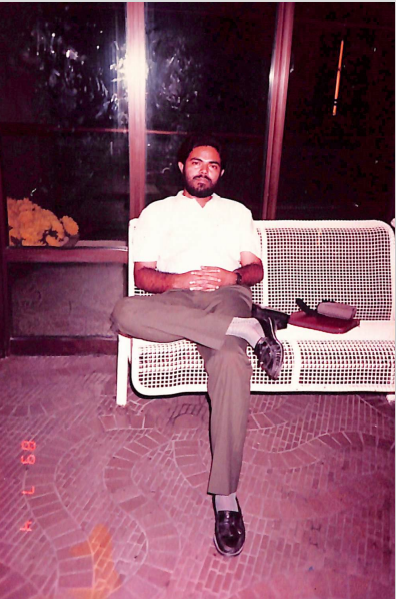In the middle of 1993, I first encountered the brute force of law and authority in the Maldives. I was studying law at the International Islamic University in Malaysia at the time. I had just returned to Feydhoo, Addu Atoll, to spend my semester break with my mother and family members. My brother Ibrahim Saeed had returned from Pakistan a year before, having completed his studies in Islamic theology. He accepted a teaching position at the neighboring Island school, Irushaadhiyya. On his way home one late evening, he ran into a couple of colleagues who were deep in conversation. He enquired about the nature of the conversation they were having. One of his colleagues responded that they were discussing that people who oppose the government were Wahhabis. [1] Politicians and government officials used the term Wahhabism to describe religious conservatives in a derogatory way back then, and to some extent still do today. When the colleague used that term, he was clearly referring to my brother.
[1] Wahhabism is a Sunni fundamentalist movement founded in the 18th century in Saudi Arabia by conservative theologian scholar Mohamed Bin Abdul Wahhaab.


My brother joked that if opposing the government of the day qualifies one as a Wahhabi, then our President Gayyoom is a model Wahhabi because he openly opposed the administration of his predecessor, President Nasir. His coworkers informed the Atoll Chief, the highest government official on each atoll, about his “serious crime.” The authority concluded that the Ministry of Defense in capital Male’’ should investigate this seditious act, which carried a life sentence.
The same night, my brother was shipped to Male’. It would take him 48 hours to reach Male’. The ship’s captain was required to ensure that my brother reported directly to the Ministry of Defense, which is standard practice for captains in such situations.
My brother reported to the Ministry of Defense upon his arrival. He was mentally and physically prepared to be detained indefinitely. The officer in charge of his case requested that he report the next day. His answer was that he has no place to go. The official in charge promised to speed up the case if my brother could find overnight lodging. My brother agreed and stayed with our relative Ibrahim Latheef.
The following day, my brother reported to the Ministry of Defense. He was so certain that he would end up in prison that he brought his packed bag along. He was forced to sign a confession statement by the authorities. His protests were futile. He was required to provide written assurance that he would not commit such “offenses” in the future. As this was his first offense, President Gayyoom graciously agreed to “forgive him” this time, he was told.
My brother was one of the lucky ones. The opposite was the norm. There were plenty horror stories of people being imprisoned, tortured. During 2008 Presidential election campaign, I came across one such horrific story.
We held a campaign rally and spent the night on the island of Dhihdhoo in the Haa Alif Atoll (Northern part of the country). We would often interact with locals after rallies and listen to what they had to say. One elderly man described a harrowing experience he had. As he related, one day he was watching President Gayyoom speak at an event. The President kept sipping water during his speech, which the old man found amusing. He unconsciously stated that the “Water Drinking Uncle” can’t continue without drinking water (fenboa beybe fen boanetha!). He was immediately shipped out to Male’ to be interrogated, and then charged by the Ministry of Defense.
He was blindfolded and his hands were tied during the entire voyage. He claimed he was beaten for 45 days in the infamous Dhoonidhoo Island prison. He was never charged or convicted of any offence. Fortunately, the old man had some powerful friends in Male’. They managed to free the old man and return him to his island. The way he told the story and his trembling voice made it clear that the old man had never recovered from his traumatic experience.
It made me think, “Boy, was my brother lucky”
During my student years in Malaysia and later in Australia, naturally I encountered lots of law students, law lecturers, legal practitioners, and judges. Understandably they were eager to know the kind of law and the legal system applied and practiced in the Maldives. I always refer to our laws as Maika Law. Naturally, they had never heard of such a law! As a result, I feel compelled to describe Maika Law. I’d tell them that Maika Law is a mixture of English Law, Islamic Law and local traditional laws to form what is known as “Maika Law.”
Maika Law translates to “Mother-in-Law” in Adduvan Dialect (a dialect of the national language Dhivehi spoken in the southern part of the country). The expression is frequently used as an insult. However, in my mischievous and cynical student mind I felt that the somewhat derogatory aspect of the terminology reflected the state of the law and legal system in the country at the time.
I had no idea that a few years later I would have the opportunity, responsibility, and authority to overhaul the Maika Law that I had so dismissively described to so many people.
